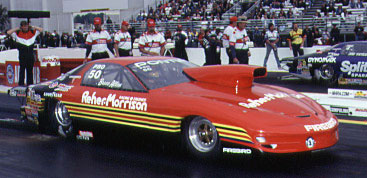
|
RS: Didn't all the work last year seem to pay off by the end of the
season?
BA: I approach every season like the manager of a baseball
team who's aware of the ups and downs his team will face for the entire
162-game schedule. I guess that's because I'm from the old school
and have done this for such a long time that I feel like you have
to be working hard even when you're not doing well. But at the same
time, you have to be realistic. For instance, in a lot of baseball
games you have to know when to throw in the towel and give up on winning
that game. When you're behind 9-0 in the ninth inning, you don't put
your best pitcher in there to try and win the game. You wait until
you have an opportunity to win a game before you go to your stopper.
In the last couple of years, even though we struggled, we knew we
had to be out there racing and working on our cars and engines to
get to where we could win those close games in the ninth inning. I
think we're there now. The difference is our mind-set. Before when
we went out to compete we felt like we had to be really lucky to win
a race or even win a round. Now that's not the case. We're fast enough
to go out and win those rounds and win a race without being lucky.
We can win a race just by being the fastest car on any given Sunday
and that definitely makes it much more enjoyable.
 RS:
Is there a different approach in how you set your car up for qualifying
and how you prepare for raceday? RS:
Is there a different approach in how you set your car up for qualifying
and how you prepare for raceday?
|
BA: When the conditions are favorable to go fast, as in qualifying,
you know that it's a go-for-it-all situation. You don't hold anything
back because you want to get as high on the ladder as possible, which
is generally an advantage. In Phoenix, Jamie Yates qualified in the
16th position and went against Kurt (Johnson) in the first
round, who ended up shaking the tires and losing. Jamie was then able
to make it into the semifinals. That doesn't always happen, but on
raceday the condition of the track is usually quite a bit worse than
when you qualified. Only because in qualifying, you're going to get
one or two sessions of really nice weather. When it comes to race
day, you're at the mercy of maybe losing lane choice or running after
the fuel cars, which is usually always a disadvantage for the Pro
Stock Cars because of the clutch dust and oil that gets on the track.
You have to take what the track will give you and be a little conservative,
but at the same time you need to run fast enough to win the round.
You can't worry about it, you just have to go and try to beat who
ever you're racing and make the best run you can. If it all unfolds
to be in your advantage, that's great. But if it doesn't, there's
not a lot you can do about it.
RS: Do you approach racing the way you do
golf? Where you're not really playing someone else as much as you're
trying to play your game and score the very best you can?
BA: From the Reher-Morrison standpoint that's true, but I
don't think that everyone has that same approach. Our approach is
that you can't affect what someone else does, you can only control
your own outcome. If you do the best you can to not beat yourself
and go out there comfortable, knowing that you can get down the track,
then you're going to try and run as fast as you can. Then if somebody
outruns you, there isn't anything you can do about it. On the other
hand, some people take the approach that you need to go for it all.
There's certainly nothing wrong with that other than if it doesn't
fit your style, you'll usually mess up. You find that once you get
out of your element, you start doing things that you shouldn't be
doing. We've raced for years, and we know that one race isn't going
to make the whole season. A successful season is the result of adding
everything together and you have to take it somewhat as it comes.
 |
page 2 of 3
|
|
|